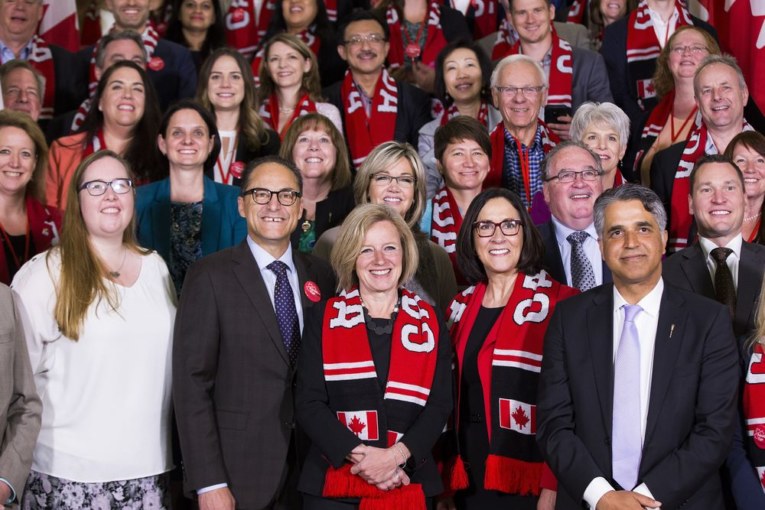
Welcome to Alberta, business leaders of British Columbia.
Hope you brought along your gasoline cans, just in case.
“We’re going to fill up on gas while we’re here, for sure,” said B.C. Chamber of Commerce president Val Litwin, responding to a joke Thursday while visiting the Alberta legislature.
The world of politics and business can be a funny place at times, full of ironies and strange coincidences.
Take, for example, the 100 B.C. business, labour and First Nations leaders like Litwin who boarded a 5 a.m. flight from Vancouver’s airport to fly across the Rocky Mountains and meet up with colleagues from Alberta.
It came less than 24 hours after Premier Rachel Notley threatened to turn down the energy taps to British Columbia, potentially spiking gasoline prices and escalating the trade dispute between the provinces.
Thursday’s trip, billed as the Federation Flight, was designed to “bridge the rift” between the provinces over the contentious Trans Mountain pipeline project that now has the neighbouring governments at each other’s throats.
From a wine ban and bitumen blockade to ongoing court challenges, the relationship between the NDP governments of Rachel Notley and John Horgan couldn’t be more dysfunctional.
Thursday’s mini-trade mission was aimed at delivering a positive message, building up support for the benefits of interprovincial trade.
It’s important to remember the equivalent of $34 billion worth of goods and services flow smoothly across the border each year, bereft of bickering or back-biting.
But the Federation Flight also occurred the day after Bill 12 passed, arming the Alberta government with power to issue oil and natural gas export permits.
The legislation is supposed to maximize the value of Alberta’s resources.
In reality, it’s aimed at punishing B.C., threatening to restrict energy flows westward, just as the coastal province tries to prevent Kinder Morgan’s Trans Mountain expansion from being built — a development worth billions of dollars to Alberta’s treasury.
“I am ready and prepared to turn off the taps,” Notley declared Wednesday, prompting B.C. Attorney-General David Eby to threaten to take Alberta to court, calling the bill unconstitutional.
It’s a far cry from the welcoming embrace Alberta cabinet ministers gave the B.C. delegation at the legislature Thursday. The two sides stood together on a staircase and sang the national anthem, basking in the glow of sharing a common cause.
The B.C. business community supports the federally approved pipeline, even though the Horgan government wants to keep it from being built.
“This is not about a pipeline anymore. This is about confidence in Canada. So we’re here to remind Albertans they have support in B.C.,” Litwin said in an interview.
“We want to see this project move ahead, and we won’t be drowned out by the voices of ‘No’ on this project.”
That’s obviously why they were feted with a luncheon in Edmonton that featured the premier speaking about the benefits of the pipeline, and an array of cabinet ministers at the legislature to make them feel at home.
It’s easy to roll out the carpet and be hospitable to like-minded individuals.
Imagine the welcome at the legislature for B.C. Environment Minister George Heyman or pipeline critic Tzeporah Berman, a former co-chair of the Alberta Oil Sands Advisory Group. I suspect it would include a Simpsons-like moment, with Monty Burns declaring: “Release the hounds.”
Speaking later to reporters, Notley stressed Alberta isn’t trying to create hardship for B.C. consumers through Bill 12, but is driving toward one goal: getting Trans Mountain back on track.
“I am sure they’re not super pumped about Bill 12, but at the same time, I think they also see where we’re headed,” she said of the B.C. contingent.
“We share a common destination we want to get to.”
The travelling delegation said it would not to be deterred by the unfortunate timing of their trip.
Business leaders from both provinces stressed the importance of building the pipeline, not just to create jobs and trade, but to show global investors the federation can get big projects done while respecting the rule of law.
They spoke about their concern over where the incessant infighting is headed, such as the ban on B.C. wines that Alberta introduced and suspended earlier this year, or the court reference question Horgan is pursuing to limit additional heavy oil shipments into his province.
“None of that is helpful. We’re not here to exacerbate that risk,” said Iain Black, head of the Greater Vancouver Board of Trade. “We really have to rise above the politics of it and encourage our leaders to do the same.”
The reality is the two provincial governments are now fully at war. Politically, neither side is willing to give in.
The shelling won’t cease while Kinder Morgan’s May 30 deadline on proceeding with the project draws near.
At least business groups in both provinces are prepared to talk with each other.
“Doing things in person does matter. It’s why the federal and provincial governments do trade missions to other countries,” said Zoe Addington of the Calgary Chamber of Commerce.
“While I’d hate to suggest we need trade missions within the country, maybe that’s where we are at.”
In fact, that’s exactly where we’re at in Canada today. That’s why Federation Flight needed to take off in the first place.
If governments aren’t able to work through their differences and seek solutions, someone else has to begin the Rocky Mountain reconciliation.
Chris Varcoe is a Calgary Herald columnist.
.com
You can read more of the news on source
